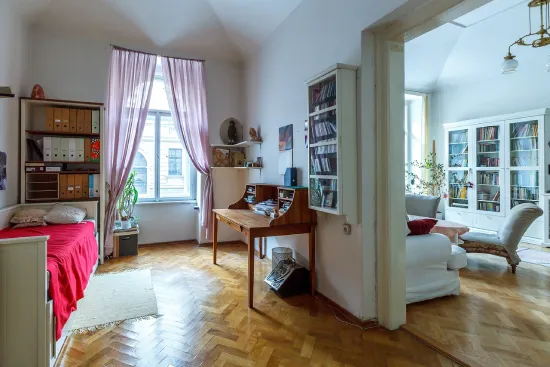How Is Selling A Co-op Different From Selling A Condo?
A technical difference between a condo and a co-op is that a condo is a real estate asset that you own in a building that you share with other property owners. Your responsibility to other residents of the building is limited to paying for your part of the common amenities that all residents share. On the other hand, a co-op is a corporation that you own with the other residents of the building, and your share of the corporation comes with the right to dwell in the only asset the corporation owns – The co-op building. As a result, you are more invested in the overall financial health of the building than you would be in a condo.
As a consequence of this arrangement, a co-op board wields much more power than a condo board, and the influence it has on the sale of your co-op apartment is the biggest difference between selling a co-op and a condo.
- A co-op board has the right to reject any candidate for any reason(other than discrimination, but it’s almost impossible to prove regardless), and they are not required to share this reason with the potential buyer or you, the seller. They can do so even if the buyer has all the right financial qualifications. As a seller, you are legally within your rights to sue your board for rejecting multiple suitable candidates but a long and protracted legal battle with your building may hold up the sale even more.
- When you are selling a co-op, you are more likely to deal with homebuyers than investors. Since most co-ops have rules against subletting and require the buyer to stay in the buildingfor a specific period before they can sublet their apartment, this is different from condos which may attract many investment-oriented buyers. So you may have to deal with only one pool of potential buyers.
- A co-op may take more time to closethan a condo, because of the board’s involvement. It changes from co-op to co-op. Depending on the buyers your apartment is attracting, the board approval process (on average) increases the time.
There is no major discernable difference between how long a co-op sits on the market compared to condos as it varies from quarter to quarter and from one borough to another. For 2022, it was observed that the difference was minimal in Manhattan, and in Brooklyn, co-ops sat in the market longer than condos in three out of four quarters.
Decide Whether To Go FSBO Or Sell With An Agent
As a seller, you have to pay for the full broker/agent representation – yours and the buyers. You can choose the FSBO route, but in order to access its full financial benefit, which is saving the 5-6% commission, you will have to sell to unrepresented buyers. Most buyers in NYC are represented and if you want to sell your co-op to all the potential buyers in the market, be prepared to pay the buyer’s agent’s commission. At 3%, it will cut your FSBO savings to half. Then there is the fee associated with buying a listing. You have to determine whether the additional effort you are making for taking the FSBO route – especially if you are doing it for the first time and have to learn everything from scratch – is worth the amount you will save in the deal.
It’s important to understand that when you are selling a co-op, you might have a bit more difficulty than if you were to sell a condo without an agent because you can’t just go with the buyer, you think is right. You have to find and vet the buyers from your co-op board’s perspective as well.
An experienced agent, especially one that has experience working with your co-op, can make quite a difference. They can help you find the right buyers that are likely to be accepted by your board and ensure that the sale goes through relatively smoothly. Just getting an agent is not enough. Your goal should be to find the right agent.
How To Set The Right Price?
The best way to come up with the right price to sell your co-op at is to find as many comps as you can. Comps are comparable properties that have recently been sold. The closer they match your property in major traits like location, amenities, monthly maintenance fees, etc., the better. Similarly, the more recent data you have access to, the better you can price your property.
If you are working with an agent, they may have access to this information and can help you find enough comps to set the right price for your co-op. You can also find several useful data points from the data available on the Department of Finance website. You can also look into your building’s recent sales history on StreetEasy. Another thing you can do is to attend open houses in comparable buildings to see what sellers of co-op apartments similar to yours are asking. Another thing your agent can do, assuming they have the right network, is to quietly spread the word about your co-op before listing it to test the waters. If they sense a lot of interest in your preliminary asking price, you may have room to go up. If the interest is low, you may consider entering the market with a slightly lower asking price.
How To Find The Right Buyer?
Finding the right buyer for a co-op is challenging because you and your co-op board, which has the power to reject your buyer, have different perspectives on who the right buyer is. For you, anyone that can either pay you cash or get a mortgage for your asking price is the right buyer, which is a massive pool.
Co-op boards look for much more than that. Their Debt to Income (DTI) requirement is more stringent than the banks – typically between 25% and 30% and they consider both mortgage payment and maintenance fees when calculating a buyer’s DTI.
The co-op board may also have additional financial requirements, like putting enough money in the escrow for one or two years’ maintenance, especially for buyers that are cutting it really close to the DTI limit. Some co-ops even require a higher down payment. Then there might be strict rules like limitations on pets, restrictions on subletting and rules for renovating your apartment.
Even if you think you know all the requirements your co-op board has for buyers from your own experience, it’s a good idea to get fresh information as some rules might have changed since you bought the place.
Once you know what kind of buyer is acceptable to your co-op board, then you can filter through the buyers to find the right ones. Moving forward with potential buyers that your board will reject based on their financial instability will simply waste time.
Seller’s Costs You Should Be Aware Of
As a co-op seller, your major closing costs will include the following:
Broker’s Commission: Since you will be paying both your and the buyer’s commission, the total would come to 5-6% of the purchase price unless you go the FSBO route.
Attorney Fee: It can be anywhere between $2,000 and $5,000, but it will vary a lot
Transfer Tax: The transfer tax for both state and city is about 1.4% of the price for properties less than $500,000. It’s between 1.825% and 2.075% for more expensive properties.
Flip Tax: Flip taxes are a unique expense associated with co-ops. They are a way for the co-op building to replenish/feed its financial reserves beyond monthly maintenance fees and get a slice of your profit from the sales. The typical number is between 1% and 3%, but it can vary greatly from building to building. If you are selling an HDFC co-op, the flip tax can easily be as high as 20% to 30% of the net sales price.
If you sell a co-op apartment for $700,000 and pay:
- 6% in agent commissions
- An attorney fee of $3,000
- 825% in transfer tax
- 5% in flip tax
Your seller costs (From these four major expenses alone) would be around $74,275 or 10.6% of the selling price.
You should also keep the capital gains tax in mind. Even if the co-op you are selling was your primary residence, you might have to pay the tax if:
- You didn’t live in the property for the last two years or for two of the last five years. This would disqualify the co-op from being classified as a primary residence, and you will have to pay capital gains tax on the entire profit sum.
- It qualifies as your primary residence, but your profits exceed $250,000 (single) or $500,000 (married, filing jointly). In this case, the tax would be levied on the sum above the minimum threshold.
Regardless of the tax applied, you can reduce the bill by leveraging deductions like capital improvements and even building improvements.
Tips To Help You Sell Your Co-Op Apartment Easily
A few tips that may help you sell your co-op smoothly and without any friction with your board are:
- When you are looking for an agent to represent you in the sale, it’s a good idea to go with an agent that has familiarity with co-ops andco-op board An agent that understands your situation well, including the tendencies and mindset of the board, is more likely to find a buyer they will approve than an agent simply following the best practices. Such an agent will be able to identify the right buyers and may give useful insights to them (or their agent) on how to prepare the board package that will easily get approved.
- Don’t price your co-op apartment too low. If the board thinks that it’s bringing down the value of the entire building, it may reject your buyers on price alone.
- Learn from each rejection. Since the co-op board is not legally required to explain their reasons for rejecting a candidate, you have no recourse to get the information from them. Instead, if they reject what you believe to be a viable candidate, you and your agent should try to identify the reason. There are several reasons beyond unstable financials for a co-op board to reject a potential buyer, including noise.
- One unorthodox way to easily sell your co-op apartment without worrying about board approval is to get on the board. That’s possible if you have been in the building long enough, have enough connections, a good reputation, and have enough time to join the board before you sell.
- Choose the right time to sell. Ideally, you should put your co-op up for sale in a seller’s market when there are fewer sellers than buyers. Factors like an underlying mortgage or tax benefit coming to an end, which will increase the monthly maintenance soon and by a significant margin, can also push away prospective buyers. Another bad time to sell is when there are several other apartments for salein the same co-op building. Potential buyers may perceive it as risky.
- Be transparent with the potential buyers from the beginning. If you deliberately avoid talking about certain aspects of the building or the co-op itself, the buyers may find it suspicious.
Other than these tips, the basic steps associated with making your property attractive for potential buyers like professional photographs, adding a floor plan to the listing, staging the apartment, refreshing your kitchen and bathroom, making some cosmetic changes (like repainting the home) can all contribute towards a quick sale. The more attractive your property is, the more buyers you are likely to attract. Then it will be easier to find the ones your board will most likely approve.















